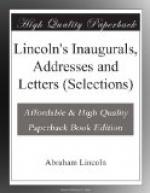The Lincoln-Douglas Debates furnish perhaps the best example of this class of public speaking that is available. Although they were extempore, as far as the actual language is concerned, they have been preserved in full. In spite of the informal style appropriate to the “stump,” these discussions of the Dred Scott decision, Popular Sovereignty, and the other questions suggested by slavery are marked by a closeness of reasoning and a readiness of retort that show the great master in the difficult art of debate. These qualities are not confined to the one speaker, for his opponent was no less adroit and ready. We may well say in this connection, “there were giants in those days.”
Much of Lincoln’s success in these historic debates was due to his intense conviction of the righteousness of the cause for which he was pleading. As lawyer and political speaker Lincoln always felt the necessity of believing in his case. He frequently refused to appear in suits because he could not put his heart into them, and he never defended a policy from mere party loyalty. Much of Lincoln’s success as a speaker was due to the fact that his hearers felt that they could trust him. This is simply a new application of the old principle that the chief qualification for success in oratory is character. In reading a man’s books we may forget his character for the time, but in listening to an orator we have the man himself constantly before us, and he himself makes or mars his success.
In 1859 Lincoln delivered his second and last long occasional address—a discussion of agriculture at the Wisconsin State Fair at Milwaukee. This is the only important non-political speech by Lincoln that has been preserved and it is interesting as showing his ability to treat a subject of general interest. Here, as in his discussions of political questions, Lincoln displayed true statesmanlike insight and foresight, long before the time when experiment stations and farmers’ institutes began to teach the very principles that he so wisely and effectively expounded.
In 1860 Lincoln appeared for the first time before a New York audience and we have his own word for it that he suffered a severe attack of stage fright on that occasion. The event showed, however, that he had no reason to fear the judgment of one of the most critical audiences that ever assembled in the Cooper Union. The Hon. Joseph H. Choate, who was present, writes of his appearance: “When he spoke he was transformed, his eye kindled, his voice rang, his face shone and seemed to light up the whole assembly. For an hour and a half he held his audience in the hollow of his hand.” This address may be regarded as a precursor, and a worthy precursor, of the First Inaugural, and by many competent critics it has been given the first place among the discussions of the political situation just before the war. After such a performance there could be no hesitation on the part of those that heard it in acknowledging Abraham Lincoln as one of the most powerful speakers of his day. Before returning to Illinois Lincoln travelled through several of the New England States, making speeches in a number of the larger towns.




